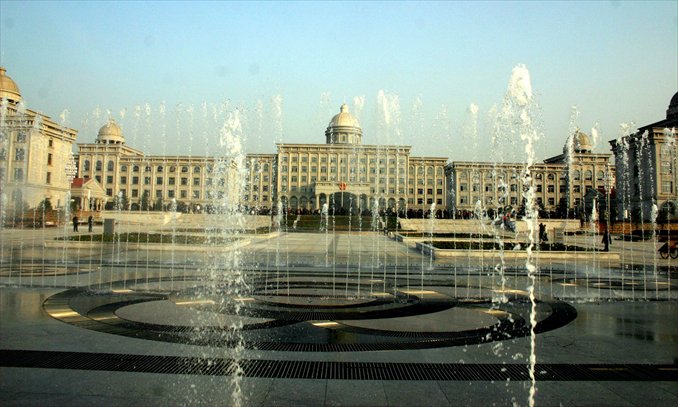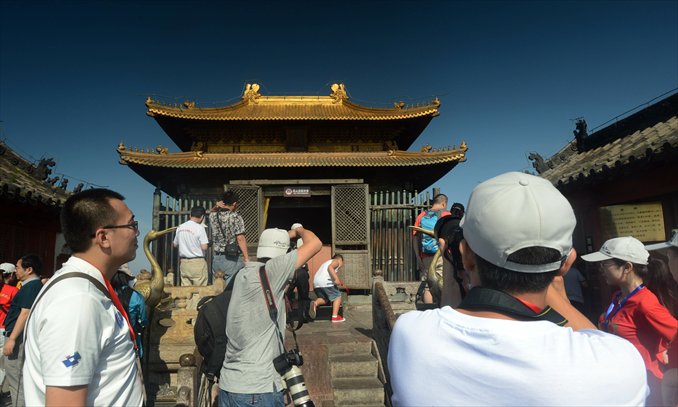Unsupervised spending on extravagant government buildings ‘out of control’

The average office space per person for the administrative committee of Wudangshan Special Economic Zone for Tourism in Hubei Province is 453 square meters, roughly 25 times the national standard, according to a recent investigative report by China Business Journal.
Wudang Mountain is located in Danjiangkou city under Shiyan of Hubei, and is one of the most famous Taoist sites in China.
The office buildings for the administrative committee have been dubbed a "maze" by local people. Its three main buildings are connected by corridors, similar in shape to the Chinese character for "king." It's easy to get disoriented when walking in the buildings, according to people who have been there.
The "maze" is also a source of mystery to people from other regions. While the name of the office building is Wudang Mountain Tourism Development Center, reporters discovered that the center is used by the working committee of the special economic zone.
Although it is used by the government, the real identity of the buildings is concealed to the public. It is difficult to discern that it belongs to the government without closely examining it, and many people easily get the impression that it is privately owned.
The local government is concerned because the building's size is far bigger than the national standard and its decoration is too luxurious, and thus cannot get approved by the higher-level government, an insider who wanted to remain anonymous told China Business Journal.
A staff member surnamed Feng with the working committee of the special economic zone has a different explanation. According to Feng, the special economic zone is focused on developing the tourism economy, and most of the government jobs are related to promoting tourism and the service industry, hence the building's name.
Bigger and better
However, Feng's claims run contrary to reporters' findings. Under the pretext of going there for business, reporters managed to enter the building. The main building has six floors - while the first floor is used for tourism services, the second to fifth floors are all used as offices for government departments for administrative affairs, contradicting Feng's claims.
The working committee and departments affiliated to the administrative committee have all moved into the new offices, according to the report.
The administrative committee has seven departments and 45 staff members. The area of its offices for administrative use covers 20,377 square meters, with the average space per person reaching 453 square meters.
This is not an isolated phenomenon. In Laohekou city, a county-level city under Xiangyang of Hubei Province, a planned center for government affairs will take up 12 hectares of land and its total building area will reach 60,000 square meters.
The office space which Laohekou city has planned for its officials is three to five times the size used by government officials at the same level in other provinces. The central government has also set standards for this.
Also, each department is to have a meeting room that can accommodate 30 people, while the center for government affairs is to be equipped with a dining hall of 4,000 square meters, and a gymnasium of 2,000 square meters.
In order to provide good feng shui, the center is backed by a mountain and faces water, while the city also plans to build a man-made lake and mountain. It also has to dig a ditch to supply water to fill the lake.
After the China Business Journal story was published, local government responded on May 18 that the tourism center is shared by more than 30 government agencies related to tourism, not just offices for Party and government offices.
Mysterious funding
Where the funding for the buildings comes from is not entirely clear, and is a source of concern for the public.
However, it is known that in order to get money for the buildings, some local governments choose to cooperate with property developers. These real estate developers provide funds for government buildings, while the local governments compensate them by selling land at lower prices.
Considering the current situation in which some local governments are struggling under huge financial pressure, where these massive funds come from has understandably become a focus of attention for the public.
The total fiscal revenue for Wudang Mountain Special Economic Zone for Tourism in 2012 was only 501 million yuan ($81.7 million), while the total investment for the buildings has reached 80 million yuan, accounting for about one-sixth of its annual income.
Before the government buildings were constructed, the local government auctioned off 200 hectares of land to an investment company named Taijihu, at a price of 1.05 million yuan per hectare.
Using the acquired land as collateral, Taijihu borrowed money from the bank, which was then used as funding for construction, explained one local insider who was unwilling to be identified.
This is in violation of a notice issued in 2007 by the General Office of the CPC Central Committee and General Office of the State Council.
According to the notice, investment for government buildings should be covered by the government budget. The practice of applying for bank loans, accepting any form of sponsorship or donation, raising funds, borrowing money from others, asking construction companies to pay or appropriating funds for special uses is banned.
"Many local governments are short of money, and inevitably they rely on land finance. As for the government building projects, only a limited number of funds are approved and are within the budget. As for the larger funds, the way they were raised has violated certain rules," said an expert on regional economy with the Academy of Development of Wuhan University based in Hubei Province.
"Pressured by a lack of funds, some local governments cooperate with real estate developers. The developers provide money for buildings while local governments sell land at lower prices to developers for commercial use. This easily leads to an exchange of interests and corruption," said the expert with Wuhan University.

Out of control
The problem of local governments constructing luxurious buildings is just a superficial one. The root of the issue lies in local governments having lost control of their investments and their behavior, said Zhang Xiaode, a professor at the Chinese Academy of Governance.
"Another problem is the lack of supervision of the financial system. The revenue comes from the public paying tax. It should be stated clearly how the money is spent, and how the local governments are supervised during the process of that money being spent," said Zhang.
Besides luxury buildings, some construction projects launched during local governments' investment sprees have far exceeded actual local demand, such as construction of museums and gymnasiums. No assessment process is conducted at all before construction, and the fact that some newly-built gymnasiums are deserted several years after being opened to the public demonstrates this kind of "blindness", he added.
Zhang's view is echoed by Feng Kui, a researcher with the China Center for Urban Development (CCUD), a public institution affiliated to the National Development and Reform Commission (NDRC).
"The reason that local governments build luxurious offices is that they are unsupervised and not investigated by the public when using public funds," said Feng.
In the name of city management, many local governments take over land from the public, and then sell this expropriated land to get funds for construction, said Peng Zhenhuai, director with the Local Government Research Institute at Peking University.
Government measures
At a press conference on March 17, Premier Li Keqiang outlined three basic rules. One of them prohibits the construction of any new buildings for government use. The central government should set an example, and higher-level governments should follow suit, said Li.
In order to meet the central government's commitments, the General Office of the State Council recently released an urgent notice seeking information on local governments' new office buildings.
The inquiry sought to determine if there are newly-approved projects or newly-started constructions after the new State Council was formed in March, and whether there are government buildings that have already been approved and launched, or projects that have been approved but not yet started before the forming of the new State Council.
Before May, the central government issued provisions setting clear standards for office space per person, banning luxurious decorations and warning against purchasing luxurious office supplies.
Those notices were released or revised in 1999, 2003, 2007 and 2012.